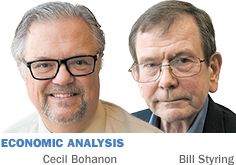Subscriber Benefit
As a subscriber you can listen to articles at work, in the car, or while you work out. Subscribe Now How are Interstate 465 and Netflix alike? The answer is that both provide what economists call network goods. Two general characteristics of a network good: First, everyone in the network has access to the network’s services. Second, the costs of maintaining the network are overwhelmingly fixed costs, while the costs of adding an additional user to the network are near zero.
How are Interstate 465 and Netflix alike? The answer is that both provide what economists call network goods. Two general characteristics of a network good: First, everyone in the network has access to the network’s services. Second, the costs of maintaining the network are overwhelmingly fixed costs, while the costs of adding an additional user to the network are near zero.
Netflix bears fixed costs for rights to broadcast (actually narrowcast) films and TV series. It invests lots in hardware to transmit those shows to individual customers via the internet. Similarly, most all of the costs of building and maintaining I-465 around Indianapolis are fixed. The cost of adding one more user (driver) is near zero.
Both networks, Netflix and I-465, are subject to congestion. If too many network members want access to services at the same time, the network slows down. Both networks can be scaled up to accommodate more users and tweaked (usually at some fixed cost) to improve the users’ experience.
But there are important differences. Netflix charges its customers a monthly fee for use and the market offers a number of good substitutes for Netflix, such as Amazon Prime, cable TV, etc. Motorists using I-465 are not charged a direct fee for use, and most drivers have few good substitutes.
Netflix, a for-profit enterprise, is able to collect enough in fees to keep its network thriving and sustainable. More on point, it has an incentive to expand and/or fine-tune the network based on profit signals. Imagine a new TV series: “The Adventures of Great Economists,” hosted by Bill and Cecil. If Netflix executives are convinced its addition to the lineup will garner more revenue than costs, they will surely add it. If it fails, it gets pulled.
Unfortunately, price and profit signals are much more oblique to the managers of I-465. The gasoline tax acts as a rough proxy for user fees, but the tax funds the entire local, state and national road network, not just I-465. Public managers of I-465 never receive a profit signal to tweak the network, such as adding an additional lane at Exit Q.
The Legislature is contemplating adjusting the current finance mechanism for our state and local transportation network. We are not going to weigh in on the particular proposals. We simply offer this food for thought: How can Indiana roads be made more like successful privately provided network goods?•
__________
Bohanon is a professor of economics at Ball State University. Styring is an economist and independent researcher. Both also blog at INforefront.com. Send comments to [email protected].
Please enable JavaScript to view this content.
